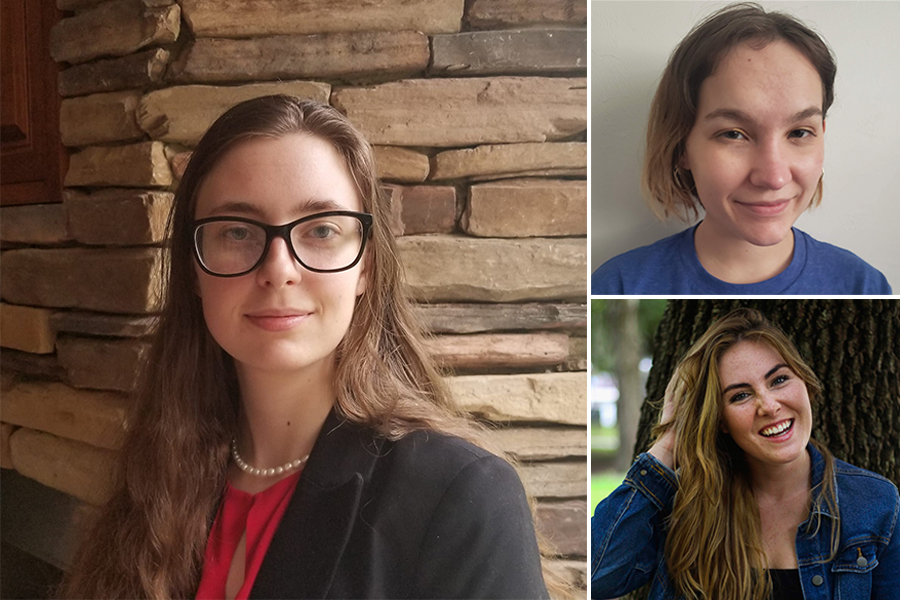FSU modern languages students earn prestigious Boren scholarships
McKenzie Harris

Three students from the College of Arts and Sciences will study abroad in 2021 to examine important national security issues.
Florida State University’s Department of Modern Languages and Linguistics is sending three undergraduate students to study in countries with languages critical to U.S. national security thanks to the David L. Boren Scholarship.
The students awarded Boren Scholarships are Russian majors Tetiana Panina and Grace Michaels and anthropology major Lauren Thornberg, who is minoring in Chinese.
Boren Scholarships, part of the U.S. government’s larger National Security Education Program, are awarded to undergraduate students committed to long-term, overseas immersive language study and to public service. Scholars conduct research to examine issues critical to the national security of the United States.
To apply, students must carefully develop an overseas study plan that conforms to and reflects Boren’s definition of national security: “not only the traditional concerns of protecting and promoting American well-being, but also the challenges of global society, including sustainable development, environmental degradation, global disease and hunger, population growth and migration, and economic competitiveness.”
Tetiana Panina, a Russian major at FSU, will visit Ukraine to study in Spring 2021. Panina immigrated to the U.S. from Ukraine in 2007 and has always paid close attention to the affairs of her home region. Her study plan includes immersion in the Russian and Ukrainian languages and their respective cultures and histories.
“I grew up watching as the political state of Ukraine, Russo-Ukrainian relations and the rest of the region’s international relations deteriorated,” Panina said. “Now, as a Russian major, it’s more common to meet students with experience pertaining to Russia rather than Ukraine.”
Panina discovered the Boren Scholarship through FSU’s Air Force ROTC program because of modern languages alumna and Air Force 2nd Lt. Stephenie Reid. As a 2019 Boren scholarship recipient, Reid studied Russian in Latvia to learn about lasting marks of Soviet leadership on Eastern Europe.
“Stephenie is a big inspiration and a really important mentor to me, and if she hadn’t gone through the process first, I would have never had the courage to put myself out there and apply,” Panina said. “I quite literally followed in her footsteps.”
Spring 2020 graduate Grace Michaels also followed a path similar to Reid’s. The Boren Awards aim to send her to Almaty, Kazakhstan, next year to continue her Russian language studies. Michaels will be commissioned as a Naval Intelligence Officer this year.
“The Boren Awards staff has been extremely helpful,” Michaels said. “I know that an increased understanding of a foreign language and culture are crucial to American foreign policy and will contribute greatly to my ability to serve this country and my own professional development.”
Along with Russian, Michaels will study history, economics, political science and more at KIMEP University. Studying in Kazakhstan offers a distinct geographical perspective on U.S. foreign policy, which is crucial in understanding the intersection of middle eastern and central Asian cultures.
“I’ll focus on the international positions of modern central Asia and Russia while analyzing central Asia as a post-Soviet satellite state. My senior thesis was about the impact of tourism on traditional Siberian culture, which is similar to central Asian culture, so I’ll try to expand it in Kazakhstan,” Michaels said.
However, Boren Scholarships aren’t open exclusively to future military officers. Lauren Thornberg, an anthropology major who is minoring in Chinese, will study Cantonese in Hong Kong during Spring 2021.
“I chose Hong Kong because I’m interested in the social structure, and my background as an anthropology major can provide new insight to how modern methods of protest work,” Thornberg said.
The Communist Party of China speaks Mandarin, while many protestors speak Cantonese, so it is important for researchers to have an understanding of both.
“I speak Mandarin at an advanced level…. Learning Cantonese will allow me to understand both what the CCP is doing and what protestors are demanding. The majority of the population in Hong Kong speaks Cantonese, so it’s a natural choice for linguistic immersion.”
This award is an important part of FSU’s commitment to provide students new opportunities. Over the past ten years, more than twelve FSU students have immersed themselves in the cultures of world regions that are underrepresented in study abroad supported by the Boren Scholarship.

